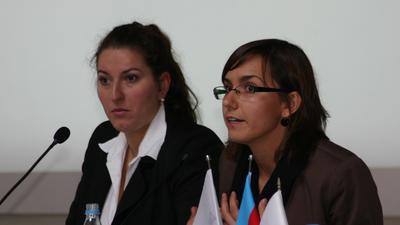-
Our work
-
Fields of work
- Arms control
- Border management
- Combating trafficking in human beings
- Conflict prevention and resolution
- Countering terrorism
- Cyber/ICT Security
- Democratization
- Economic activities
- Education
- Elections
- Environmental activities
- Gender equality
- Good governance
- Human rights
- Media freedom and development
- Migration
- National minority issues
- Policing
- Reform and co-operation in the security sector
- Roma and Sinti
- Rule of law
- Tolerance and non-discrimination
- Youth
- Field operations
- Projects
-
Meetings and conferences
- Summit meetings
- Review Conferences
- Ministerial Council meetings
- Plenary meetings of the Permanent Council
- Plenary Meetings of the Forum for Security Co-operation
- Security Review Conferences
- Annual Implementation Assessment Meetings
- Economic and Environmental Forum
- Economic and Environmental Dimension Implementation Meetings
- Human rights meetings
- Media conferences
- Cyber/ICT security conferences
- Conference of the Alliance against Trafficking in Persons
- Gender equality conferences
- Annual OSCE Mediterranean conferences
- Annual OSCE Asian conferences
- Partnerships
-
Fields of work
-
Countries
- All
-
Participating States
- Albania
- Andorra
- Armenia
- Austria
- Azerbaijan
- Belgium
- Belarus
- Bosnia and Herzegovina
- Bulgaria
- Canada
- Croatia
- Cyprus
- Czechia
- Denmark
- Estonia
- Finland – OSCE Chairpersonship 2025
- France
- Georgia
- Germany
- Greece
- Holy See
- Hungary
- Iceland
- Ireland
- Italy
- Kazakhstan
- Kyrgyzstan
- Latvia
- Liechtenstein
- Lithuania
- Luxembourg
- Malta
- Moldova
- Monaco
- Mongolia
- Montenegro
- The Netherlands
- North Macedonia
- Norway
- Poland
- Portugal
- Romania
- Russian Federation
- San Marino
- Serbia
- Slovakia
- Slovenia
- Spain
- Sweden
- Switzerland
- Tajikistan
- Türkiye
- Turkmenistan
- Ukraine
- United Kingdom
- United States of America
- Uzbekistan
- Asian Partners for Co-operation
- Mediterranean Partners for Co-operation
-
Structures and institutions
- Chairpersonship
-
Secretariat
- Secretary General
- Office of the Secretary General
- Conflict Prevention Centre
- Transnational Threats Department
- Office of the Special Representative and Co-ordinator for Combating Trafficking in Human Beings
- Office of the Co-ordinator of OSCE Economic and Environmental Activities
- Gender Issues Programme
- Opportunities for Youth
- Department of Human Resources
- Department of Management and Finance
- Office of Internal Oversight
- Documentation Centre in Prague
- Institutions
-
Field operations
- Presence in Albania
- Centre in Ashgabat
- Programme Office in Astana
- Programme Office in Bishkek
- Mission to Bosnia and Herzegovina
- Programme Office in Dushanbe
- Mission in Kosovo
- Mission to Moldova
- Mission to Montenegro
- Mission to Serbia
- Mission to Skopje
- Project Co-ordinator in Uzbekistan
- Closed field activities
- Parliamentary Assembly
- Court of Conciliation and Arbitration
- Organizational structure
- About us
Press release
OSCE Office in Baku hosts workshop on establishing a National Preventive Mechanism in Azerbaijan

- Date:
- Place:
- BAKU
- Source:
- OSCE Project Co-ordinator in Baku (closed)
- Fields of work:
- Rule of law, Human rights
BAKU, 25 November 2009 - The OSCE Office in Baku opened a two-day workshop today to examine the implementation of the UN Optional Protocol to the Convention against Torture and the establishment of a National Preventive Mechanism (NPM) for the prevention of torture and other forms of ill-treatment in places where people are deprived of liberty in Azerbaijan.
The Office organized the workshop in co-operation with the OSCE Office for Democratic Institutions and Human Rights and Azerbaijan's Ombudsman's Office. Participants include staff from the Ombudsman's Office, representatives from relevant state authorities and non-governmental organizations active in the prevention of torture and other forms of ill-treatment.
"The OSCE Office in Baku believes that the successful establishment and effective operation of the Azerbaijani NPM will be key to the country's efforts to fight torture and other forms of inhuman and degrading treatment," said Melissa Stone, the Deputy Head of the OSCE Office in Baku.
"We hope that this workshop will support co-operative efforts to strengthen the protection of persons deprived of their liberty in Azerbaijan."
The workshop will focus on both the theoretical and practical aspects of the preventive mandate of NPMs and best practices from OSCE participating States. Presentations will be delivered by experts from the Human Rights Implementation Centre of the U.K.'s Bristol University, as well as by representatives of NPMs from Estonia, Poland and Georgia.
The OSCE Office in Baku regularly conducts detention monitoring, including of police stations and remand detention facilities. The Office also supports the Parliament with the adoption of new legislation on the rights of suspects and the accused.
The Office will also translate and make public an Azerbaijani version of a guide on monitoring places of detention, issued by the Association for the Prevention of Torture to raise awareness about international standards for detention monitoring.
According to the UN Convention Against Torture, Inhuman and Degrading Treatment and Punishment, torture constitutes "any act by which severe pain or suffering, whether physical or mental, is intentionally inflicted on a person for such purposes as obtaining from him or a third person information or a confession, punishing him for an act he or a third person has committed or is suspected of having committed, or intimidating or coercing him or a third person, or for any reason based on discrimination of any kind, when such pain or suffering is inflicted by or at the instigation of or with the consent or acquiescence of a public official or other person acting in an official capacity."